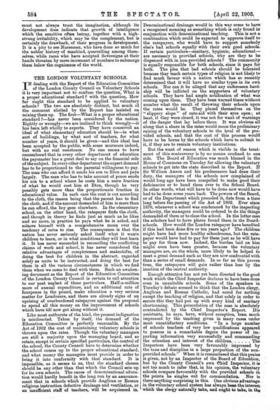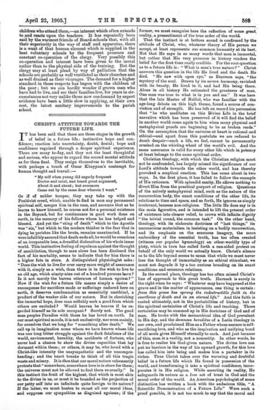I N dealing with the Report of the Education Committee of
the London County Council on Voluntary Schools it is very important not to confuse the question, What is a proper educational standard ? with the question, How far ought this standard to be applied to voluntary schools ? The two are absolutely distinct, but much of the comment elicited by the Report has insisted on mixing them up. The first—What is a proper educational standard ?—has never been considered by the nation. Rightly or wrongly—we are inclined to think wrongly—it has been left wholly to experts. They have conceived an ideal of what elementary education should be—in what sort of buildings, by what sort of teachers, for what number of years, it should be given—and this ideal has been accepted by the public, with some murmurs indeed, but with no real resistance. No one seems to have remembered that in every other department of education the paymaster has a great deal to say on the financial side of the subject. In every other department the expert demand has to be proportioned to the parental willingness to pay. The man who can afford it sends his son to Eton and pays largely. The man who has to take account of pence sends his son to a school where he costs him a mere fraction of what he would cost him at Eton, though he very possibly gets more than the proportionate fraction in educational value. In each case the coat is cut according to the cloth, the reason being that the parent has to find the cloth, and if the amount demanded of him is more than he can afford, the boy goes elsewhere. In the elementary school, on the other hand, the ratepayer finds the cloth, and though in theory he finds just as much as he likes and no more, in practice he pays what he is asked, and solaces himself with a comprehensive moan over the tendency of rates to rise. The consequence is that the nation has never seriously asked itself what it wants children to learn, or in what conditions they will best learn it. It has never succeeded in reconciling the conflicting claims of work and school, it has never considered the relative advantages of completeness and makeshifts, of doing the best for children in the abstract, regarded solely as units to be instructed, and doing the best for them in all the various circumstances in which we find them when we come to deal with them. Such an awaken- ing document as the Report of the Education Committee of the London County Council is certain to call attention to our past neglect of these particulars. Half-a-million more of annual expenditure, and an additional rate of fourpence iu the pound, make education a very serious matter for Londoners, and there are already signs of an uprising of overburdened ratepayers against the proposal to spend all this money on the improvement of schools which have till now got along without it.
Like most outbursts of the kind, the present indignation is misdirected. Taken by itself, the demand of the Education Committee is perfectly reasonable. By the Act of 1902 the cost of maintaining voluntary schools is thrown upon the rates. Though the voluntary managers are still a majority upon the managing board, and so retain, except in certain specified particulars, the control of the school, the County Council have to determine whether the school comes up to the proper educational standard, and. what money the managers must provide in order to bring it into conformity with that standard. It is impossible, as it seems to us, that the standard chosen should be any other than that which the Council sets up for its own schools. The cause of denominational educa- tion would hardly benefit in the long run by an announce- ment that in schools which provide Anglican or Roman religious instruction defective drainage and ventilation, or an insufficient staff of teachers, will be acquiesced in. Denominational drainage would in this way come to have a recognised meaning as something which is only found in conjunction with denominational teaching. This is not a combination which could be expected to approve itself to the ratepayers, who would have to support somebody else's bad schools equally with their own good schools. If certain particulars—sanitary, hygienic, educational— are necessary in provided schools, why are they to be dispensed with in non-provided schools ? The community is equally responsible for both schools, since it pays for both. The plea that bad schools should be tolerated because they teach certain types of religion is not likely to find much favour with a nation which has so recently determined that it will have no similar types in its own schools. Nor can it be alleged that any unforeseen hard- ship will be inflicted on the supporters of voluntary schools. They have had ample notification of what was coming upon them. They have been warned times without number what the result of throwing their schools upon the rates would be. They placed themselves on the "slippery slope" of rate-aid with their eyes open ; at least, if they were closed, it was not for want of warnings of the danger that lay before them. It was obvious all along that a share in the rates would mean the preliminary raising of the voluntary schools to the level of the pro- vided schools, and that the cost of this process would have to be borne by the schools which have to submit to it, if they are to remain voluntary institutions.
But the want of reason which is visible in the treat- ment of this controversy is by no means confined to one side. The Board of Education was much blamed in the House of Commons on Tuesday for allowing the voluntary schools to get into the state described in the Report. If Sir William Anson and his predecessors had done their duty, the managers of the schools now complained of would long ago have been compelled to make good. their deficiencies or to hand them over to the School Board. In other words, what will have to be done now would have had to be done some years back. The powers of the Board, or of the Department which preceded it, date from a time long before the passing of the Act of 1902. Ever since 1870, whenever a school was condemned by the inspecting authority, the managers could be ordered to do the things demanded of them or to close the school. In the latter case the scholars had to have places found them in the Board- schools. How would the London ratepayer have benefited if this had been done five or ten years ago ? The children might have had more healthy schoolrooms, but the rate- payer would have had to pay for them just as he will have to pay for then. now. Indeed, the burden laid on him might even have been greater, because the voluntary managers are, on the whole, more likely to be helped to meet a great demand such as they are now confronted with than a series of small demands. In so far as this proves true, the ratepayers will gain rather than lose by the inaction of the central authority.
Enough attention has not yet been directed to the good work which the Chief Inspector declares to have been done even in unsuitable schools. Some of the speakers in Tuesday's debate seemed to think that the London clergy, Anglican and Roman Catholic, had cared for nothing except the teaching of religion, and that solely in order to secure this they had put up with every kind of sanitary shortcoming. This presentation of the case is absolutely contradicted by the Chief Inspector's Report. His assistants, he says, have, without exception, been much impressed by the teaching given in many cases under most unsatisfactory conditions. "In a large number of schools teachers of very low qualifications appeared to possess in a remarkable degree the power of im- parting information very successfully and commanding the attention and interest of the children The Inspectors have been very favourably impressed by the tone and discipline in a large proportion of the non- provided schools." When it is remembered that this praise is given, not by an Inspector of the Board of Education, but by the County Council's own Chief Inspector, it is not too much to infer that, in his opinion, the voluntary schools compare favourably with the provided schools in the points he singles out for commendation. Nor is there anything surprising in this. One obvious advantage in the voluntary school system has always been the interest which the clergy naturally take, and ought to take, in the children who attend them,—an interest which often extends to and reacts upon the teachers. It has repeatedly been said by the warmest friends of Board-schools that, with all their !superiority in the way of staff and apparatus, there is a want of that human element which is supplied in the best voluntary schools by the frequent presence and constant co-operation of the clergy. Very possibly this co-operation and interest have been given to the moral rather than to the physical side of the training. But the clergy may at least plead by way of palliation that the schools are probably as well ventilated as their churches and as well drained as their vicarages. The demand for a higher standard in these respects has begun with the children of the poor ; but we can hardly wonder if grown men who have had to live, and see their families live, for years in cir- cumstances not very unlike those now condemned by expert evidence have been a little slow in applying, at their own cost, the latest sanitary improvements to the parish school.



































 Previous page
Previous page